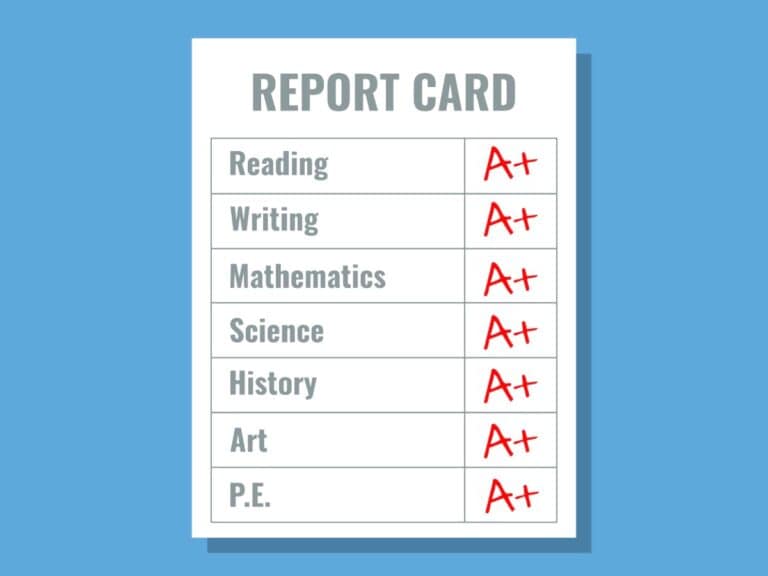How Colleges Evaluate Transcripts: Ultimate Guide
You can think of your high school transcript as a report card that is more detailed than the one that is handed to you or your parent or guardian at the end of every semester.
It packs more details because its goal is to let the college that you wish to go to know whether or not you will make for a great addition to its campus.
So, what do colleges see on your transcript?
When checking students’ high school transcripts, colleges evaluate the following: GPA in core academic subjects, such as English, math, science, and social studies; coursework rigor; overall grade trends, class rank, and the existence of disciplinary records.
But first, here are a few important matters on your high school transcript that you might want to know about…
Information Found on Your High School Transcript
Many things can be found on your transcript. It is to give anyone who is looking at it an idea of your overall academic performance in high school.
Also, it is to make it easier for college admissions officers to make a decision. However, keep in mind that your transcript is just one of the things that they will look at.
Usually, the topmost part of your transcript is occupied by your high school’s name, as well as its address and contact details. The area is shared with your personal information, such as your name, name of your parents or guardian, date of birth, home address, and contact details.
Other significant information that are included in your transcript are the following:
- Date of enrollment
- Date of graduation
- List of all courses taken (arranged from the oldest to the most recent)
- Credits and grades earned for each course
- GPA
It is not unlikely for your high school transcript to also include your:
- Standardized test scores
- Class ranking
- Disciplinary record (suspension, expulsion, etc.)
Every high school follows a different format and a set of standards when it comes to the layout of the transcript, as well as the details included in it. To have a better idea of how your high school transcript looks like and what it says, you may request a copy of it from your school registrar or guidance counselor.
Your transcript may look entirely different from the transcript of a student from a different high school.
However, one thing is for certain: It includes pretty much everything that college admissions officers may use to estimate your academic performance, which is crucial when they are figuring out whether you should get accepted or rejected.

Official Transcript vs. Unofficial Transcript: Know the Difference
Before we start talking about how colleges evaluate high school transcripts, let us first momentarily talk about the two different kinds of transcripts.
Yes, there are a couple of them. Each one has its own purpose, and thus coming in handy in certain situations.
The first kind of transcript is the official transcript. Just like what the name says, it is your legit transcript. However, it doesn’t mean that the other kind is not legit, as you will learn in a few.
Your official transcript is your transcript that is printed on a special kind of paper.
What’s more, it is watermarked. The presence of a watermark makes your official transcript more difficult to copy and use without your high school’s permission.
You cannot get your hands on your high school transcript. Your school will be the one who will send it to the college that you are applying to, in an envelope that is sealed and signature-stamped.
On the other hand, your high school may give you your unofficial transcript in case you need it, such as if the college you wish to apply to requires it.
Needless to say, your unofficial transcript is printed on ordinary paper. It also doesn’t come with a watermark, various signatures, and other bells and whistles that you can find on your official transcript.
Keep in mind that the college who will request your unofficial transcript will also ask for your official transcript, but it will get in touch directly with your high school.
Now let us take a look at what colleges look for during the admission process.
How Colleges Evaluate Transcripts
Admission Officers Take a Look at Your GPA
One of the primary sources of stress and anxiety in high school students when applying to colleges is their grade point average or GPA, which can spell the difference between being accepted and rejected.
But before we proceed, let’s get one thing straight: Your GPA is just one of the things that colleges look at.
Despite this, the importance of having an impressive GPA cannot be stressed enough. This is especially true since it is written on your high school transcript.
Meaning to say, college admissions officers can easily see your GPA. To increase your chances of going to the elite college that you like, you need to work hard to get a stellar GPA.
Here’s the deal with GPA: It cannot be used by college admissions officers as a common data point for comparing students’ academic prowess.
That’s because different high schools have different ways of computing GPA. What’s more, different high schools have varying GPA scales.
For instance, one high school may go for the unweighted GPA scale, while the other may opt for the weighted GPA scales. And by the way, colleges may prefer different GPA scales, too!
Let’s take a quick look at the key differences between the two GPA scales:
- Unweighted GPA scale. First and foremost, this is the most commonly used GPA scale. It also has the more straightforward computation of the two. Your unweighted GPA is computed by adding your total score and then dividing the sum by the total number of the classes you took. It does not consider the difficulty of the classes taken. The highest unweighted GPA that you can get is 4.0.
- Weighted GPA scale. Here’s something that makes computing your weighted GPA scale complicated: It can be done in different ways. It is computed by multiplying your unweighted GPA to the number of classes that you took and then adding 1.0 for each high-level class and 0.5 for each mid-level class. Laborious, isn’t it? By the way, the highest weighted GPA that you can get is 5.0.
So, which between the two GPA scales that colleges consider? Well, it greatly depends on the preference of college admissions officers. However, the majority of them sometimes consider both scales when deciding.
They Check Out Your Grades and Look for Trends
Naturally, some of the things on your high school transcript that college admissions officers spend plenty of time looking at are your grades.
Are you a straight-A student? Then this part of your transcript evaluation should not leave you anxious. But then again, your grades are just some of the criteria used when making a decision.
Worry not if your grades vary tremendously. It is perfectly understandable since most high school students are good in certain subjects but not that good in others.
It is because of this why college admissions officers also look for trends in your grades.
Did you have lots of A’s at the beginning of high school, but then a handful of C’s and D’s started to appear near the end of your secondary education life?
Did you kick-start your high school years with some B’s and C’s, but then in your junior and senior years, you started to shine and earned impressive amounts of A’s?
Well, if there is a pattern, it is for certain that colleges will notice it. Additionally, they will take it into account.
If there is a reason why there is an apparent drop in your grades at one point, it is a good idea to mention it on your college application.
For instance, if you suffered from a serious medical condition that affected your class attendance and performance, too, then make sure that the college admissions officers will know about the matter.
They Also Look at Your Standardized Exam Scores
High school students need to review not only for the exams that their respective teachers give.
They also have to prepare for standardized tests or tests that require all test takers from different schools to answer the same questions.
Different standardized tests are provided by different bodies or organizations to all participating high schools.
For instance, the Scholastic Assessment Test or SAT is administered by the College Board. The point of this standardized test is to assess a high schooler’s readiness for college.
It also lets colleges have a common data point, which they can use when comparing applicants in terms of academic capabilities.
Another standardized test administered in high school is the American College Test or ACT, and it is provided by ACT, Inc. Just like SAT, it gauges the readiness of a high school student for college.
Both your SAT and ACT scores, if you took them, will appear on your high school transcript. This is to allow colleges to see them.
As mentioned earlier, one of the purposes of these standardized exams is to give different colleges a way to compare students academically, as they took the same set of questions and were graded similarly, too.
Your transcript may also show your scores from other standardized exams, such as the Preliminary SAT or PSAT and Advanced Placement, an exam given by high schools that offer AP courses.
Colleges Examine Which Courses You Took Or Didn’t
You need to pick a course at college. Simply put, it is a series of classes that lead to either an undergraduate or graduate degree. In choosing a course, it is a good idea to consider what you want to be as a working adult.
However, it is not just when you are in college that you need to decide on a course. It is also something that you have to pick out in high school.
And it is not enough that you select one. You have to go for different courses, especially if you want your dream college to accept you.
That’s because college admissions officers have a preference for students who have a solid foundation of learning that preps them for the challenges of higher education.
To build that foundation of learning that colleges will be looking for, it is a good idea for you to take not less than five solid academic courses per high school semester.
Because of the pivotal role that courses in the high school play, colleges also take a look at which courses you took. Doing so allows them to have an idea of what sort of student you were in high school.
More importantly, it will let them know whether or not you will make for a wonderful addition to the campus.
As a general rule, the more challenging your courses, the more impressed college admissions officers will be.
However, this doesn’t mean that the number and difficulty level of the courses you took are the only ones that colleges will consider.
Available courses that students may take tend to differ from one high school to the next. Some of the courses offered by high school X may not be offered by high school Y.
Needless to say, college admissions officers won’t castigate you for not taking courses your high school does not have.
Check this podcast for more information:
Officers Check Out Your Class Rank, If Applicable
Did you graduate from high school with a rank? If so, it is likely that it will be indicated on your transcript. Congrats!
It will serve as proof that you are one of the smartest students in your high school, and college admissions officers will certainly take it into consideration when deciding your fate.
However, refrain from assuming that having a class rank is a guarantee that you will be accepted.
There are a couple of reasons why it is not a surefire acceptance. First, did you know that not all high schools have class ranks?
Meaning to say, just because you have a class rank stated on your transcript doesn’t necessarily mean that you are better than a bright student from another high school without one on his or her transcript simply because the school from which he or she graduated does not give rankings.
College admissions officers will consider the class rank you earned within the context of your high school. In other words, they will take a look at the bigger picture to understand the meaning of your ranking better.
For instance, they will put a lot of consideration on your rank if you graduated from a very competitive high school, which is known to have high standards and a lot of intelligent students.
Otherwise, if you finished your secondary education from a small high school, which is mediocre at best, your rank may not mean that much.
To sum up: Just because you graduated top of your class doesn’t necessarily mean you will be a college’s top choice.
They Check for Disciplinary Actions on Record

Have you been suspended because your high school deemed the bad behavior you exhibited was worthy of such disciplinary action? Then make sure that you carefully read this part!
If you are thinking about hiding your suspension from the college that you wish to go to, here’s a tip: Do not attempt to take any step that you think can keep college admissions officers from learning about your infraction.
That’s because it won’t work. What’s more, it can come back to bite you in your tush, leading to your downright rejection.
When filling out a college application form, you will come across a part where you will be asked if any misconduct of yours has led to any disciplinary action against you by your high school, such as a suspension.
This question is answered by choosing either “yes” or “no.”
If you answered “yes,” you will be asked to provide further information. If you answered “no,” even if you were suspended, then this is when a problem may start to brew. That’s because, sooner or later, the college will know whether or not disciplinary actions were taken against you.
The college will know you lied as soon as it gets a hold of your transcript, which will state that you were suspended.
If you’re caught lying before a decision is made, you will be rejected. If you’re caught after your acceptance, the college will take back its decision.
When filling out a college application form, honesty is the best policy!
Just Before You Apply to Your College of Choice
Your high school transcript speaks volumes about your performance in high school academic-wise. The information that the college admissions officers will see written on it will have a bearing on their decision: accept or reject you.
However, it doesn’t mean that it is only your transcript that will be taken into consideration.
When applying to a college, you will submit other documents, too, such as your college application form, essays, and letter of recommendation. Pieced together, they can help college admissions officers make the right decision.
Still, it is recommended for you to have a phenomenal transcript by doing your best throughout high school. But if yours is not particularly commendable, the rest of the requirements may help you get the decision that you are hoping for.
Disclaimer: The views and opinions expressed in this article are those of the authors and do not necessarily represent those of the College Reality Check.


